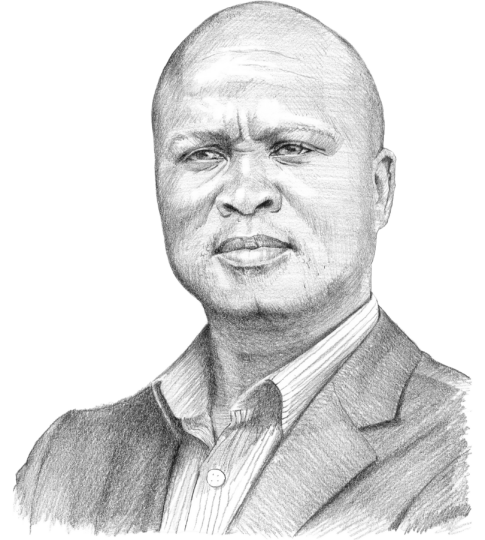Winds of change in South Africa and Botswana
The African parties associated with the struggle against colonialism long had a lock on political power, but that monopoly faces rising opposition.

In a nutshell
- The long-ruling parties in sub-Saharan Africa are facing new challenges
- Their hold on power wanes even as the opposition remains fragmented
- After decades of one-party rule, more voters press for power sharing
South Africa’s general elections in May produced significant shifts in the country’s political landscape, with one-party rule falling by the wayside. The emerging trend toward multiparty power sharing could continue in neighboring Botswana in October.
South Africa’s legacy independence party, the African National Congress (ANC), saw its share of the vote drop from 57.5 percent in 2019 to 40.2 percent in 2024, losing its perennial majority in the parliament in the process.
For the first time since the historic 1994 elections – which introduced democracy and made Nelson Mandela South Africa’s first black president and a hero worldwide – the party associated with his name has had to share power with the opposition.
President Cyril Ramaphosa (age 72) has secured a second term, but only after the ANC formed a coalition with the opposition’s Democratic Alliance and several smaller parties. That result was not entirely unexpected, given the collapse of state services, the decline of the economy and the scourge of corruption under successive ANC-led governments.
Another preeminent party surrendering its dominant political position says much about the region’s potential to shift further to multiparty governance anchored in a desire for transparency and more efficient use of public resources.
Botswana and others
Buffeted by corruption, decrepit infrastructure and high youth unemployment, which, together, signal severe governance problems, the legacy liberation parties across the Southern Africa Development Community (an intergovernmental organization headquartered in Botswana aiming to promote economic, political, social and security cooperation among 16 countries in southern Africa) are under severe pressure. Unable to convince voters that they can lead societies into the next phase of development – that is, a phase where human rights and economic advancement are not seen as mutually exclusive – they seem capable only of playing for time.
The message from South Africa is that the parties that brought freedom decades ago – even the African National Congress, which long served as a symbol of the continent’s emancipation – are vulnerable now.
In contrast to the opposition takeovers in Zambia (2021) and Malawi (2020), the opposition parties in South Africa did not purge the ANC from government. Instead, they forced it into a power-sharing arrangement, showing that the liberation parties in the region are no longer unassailable – at least, those that still play by democratic rules. Across the border in Zimbabwe, the the Zanu-PF has suppressed the opposition and clamped down on the media to stay in power.
Facts & figures
A region of political shifts

The tug-of-war in Botswana
However, Botswana’s opposition appears at least to have a shot at denting the electoral base of the ruling party: The BDP has been battling the opposition’s surge since the 2022 by-elections. Botswana’s Umbrella for Democratic Change, a coalition of left-leaning parties, is trying to challenge the dominating party’s long-standing rule.
Read more from Ralph Mathekga
- Botswana-South Africa row tests regional balance of power
- Tensions flare in Eswatini
- Old wounds reopen in Namibia
- Migration crisis in Southern Africa
The BDP faces challenges that are comparable to what the ANC was up against in South Africa in the period leading to elections this spring. The ANC’s electoral decline was, on the one hand, a result of tireless campaigns by the opposition pointing to poor governance by the ruling party. Its decline was also engineered from within when former president Jacob Zuma (2009-2018) created a splinter party (the MK Party), denting the ANC’s support base. That, in the end, forced the ruling party’s remainder to form a coalition to maintain power in the country.
In Botswana, the opposition parties and civil society organizations do not have similarly broad room to act. One reason for that is the feud between Botswana’s former President Ian Khama (2008-2018) and the current President Mokgweetsi Masisi. Mr. Khama has been self-exiled in South Africa since November 2021, following his decision to challenge his former protege Mr. Masisi’s continued leadership in Botswana.
Despite his relocation, Mr. Khama remained critical of the president and vowed to ensure his removal from office. He has backed his former foreign minister to challenge the incumbent for the ruling party’s presidential nomination for the October 2024 elections.
With a stark lesson from South Africa on what can happen in the elections if the ruling party underestimates the opposition, Botswana’s rulers are playing it safe.
President Masisi responded by preparing a plan that could potentially bar his predecessor from political involvement entirely. A “Cabinet White Paper” submitted by the government (the president is its head) to the parliament in February 2024 stipulates that retired presidents who have served two terms (10 years) should not participate in active politics upon retirement and should not be eligible for reelection to any political office. The proposal is indeed similar to laws in Kenya and Zambia, where retired presidents are prohibited from being active in politics.
According to a recent report, Mr. Khama may have settled in the Kingdom of Eswatini, which would indicate that he no longer intends to play a strong political hand in Botswana. However, the situation remains fluid. If the parliament approves the Masisi cabinet recommendation, the former president could no longer be associated with the Botswana Patriotic Front politics, which would be a significant blow to both that party and Mr. Khama’s political interests.
Botswana’s government responds
With a stark lesson from South Africa on what can happen in the elections if the ruling party underestimates the opposition, such as Mr. Zuma’s newly established MK Party, Botswana’s rulers are playing it safe. They have consolidated their party’s ranks and are ready to face the opposition in October 2024.
It is also important to remember that, as a legacy liberation party, Botswana’s ruling BDP has outperformed the ANC by every measure. Botswana is headed to its 13th general election, while the ANC stumbled in its seventh electoral test. Botswana has been a stable democracy despite the headwinds that include high youth unemployment and poverty. The ruling party has faced challenges from the opposition and survived highly contested elections. In the 2019 parliamentary balloting, the BDP held on to 29 of the 57 national assembly seats, with the opposition sharing the remaining votes.
Without an effective multiparty democracy, Botswana’s democratic viability will remain precarious.
The opposition in Botswana is even more split than its counterparts in South Africa. However, voters could weaken the BDP even if the opposition parties fail to form a unified front and offer a viable alternative. The regional trend to watch is the fading of the founding liberation parties, which leads to power sharing and co-governance with opposition parties. That process also takes place when the opposition remains fragmented.
Scenarios
Botswana’s politics is closely linked with South Africa’s, as the two countries share a liberation history. Since gaining power in Botswana in 1966, the BDP has stood by the ANC throughout the years of the anti-apartheid struggle and has had a cordial relationship with the governing ANC since democracy took root in South Africa.
Likely: Botswana’s ruling party fights to remain legitimate alone, for now
The governing record of Botswana’s liberation party is better than the ANC’s and Botswana enjoys a reputation as “a stable democracy” in a region where many governments have legitimacy problems. It is not all blue skies, of course. Botswana’s opposition parties have decried the government’s attempts to stifle multiparty democracy and curb media freedom. The country, lauded as the least corrupt in the region, could still use tighter whistleblower laws to build up citizens’ trust in government processes.
The ruling party’s entrenchment has given it the tools to politically manage even hard challenges, such as corruption – at least in the realm of public perception. Without an effective multiparty democracy characterized by alternations in power or power sharing between different parties, Botswana’s democratic viability will remain precarious.
Certain: Voters in Botswana and elsewhere demand more power sharing
The trend taking shape broadly in the 16 Southern Africa Development Community countries may signal the emergence of a new post-liberation-party era, a political phenomenon in which the electorate is leaning toward multiparty systems of governance.
Most constitutions across different jurisdictions in the region commit nations to a multiparty, democratic system based on public consultation. However, many countries have experienced single-party domination since their introduction to democratic governance. In most cases, this has not worked well for the societies being governed, especially regarding their expectation of improvements in living conditions and economic prosperity.
Botswana has been an exception to the extent that its one-party system did not collapse governance and, ultimately, create a failed-state drama. However, voters there, as elsewhere, appear to yearn for more a diverse, balanced and finessed political system. The prospect of a power-sharing arrangement is looming large for Botswana, where the government is struggling to transform the country into a modern society connected to the global economy.
For industry-specific scenarios and bespoke geopolitical intelligence, contact us and we will provide you with more information about our advisory services.









